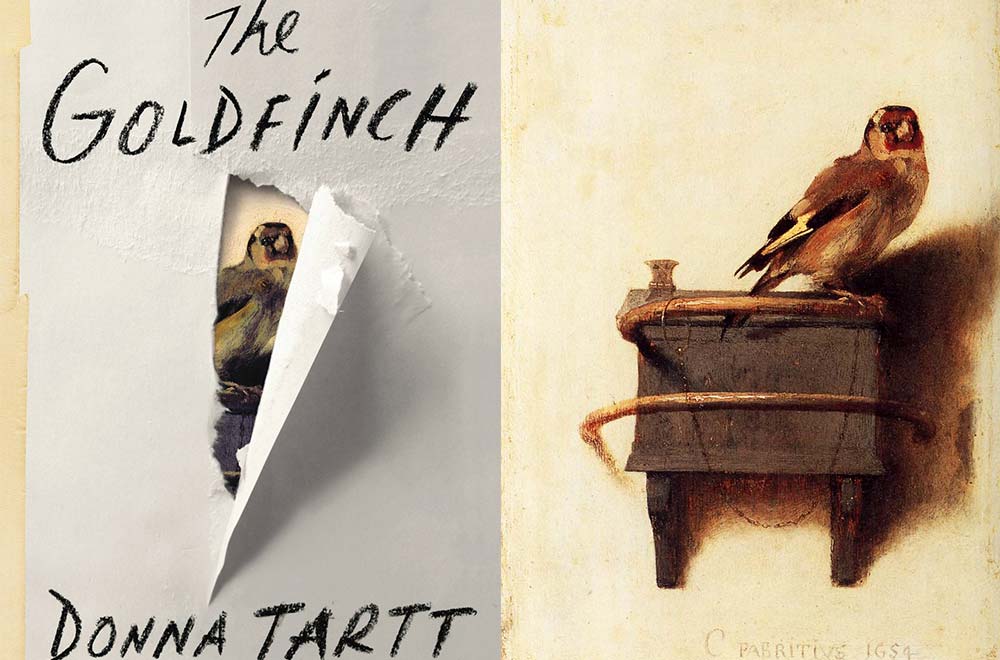When I lost [my mother] I lost sight of any landmark that might have led me someplace happier, to some more populated or congenial life. – Theo Decker, The Goldfinch

By the end of last year, The Goldfinch by Donna Tartt was hitting just about every “Best Books of 2013” list. I was unfamiliar with Tartt’s previous work, but when no less than the King himself sang her praises, I decided to give The Goldfinch a try. And sure enough, it was fantastic – earning a spot on my own Best Books of 2013 list.
The Goldfinch by Donna Tartt is a staggering, brutal and nihilistic search for meaning and beauty.
From the beginning of Theo Decker’s story, we’re immersed in a senseless, random world: His mother is killed in a terrorist attack. From that moment forward, Theo’s life is at the whim of huge, uncontrollable forces – death, governments and social services, underworld finances.
Theo reflects on his father’s gambling addiction, which he finds to be no better than any other metanarrative we use to make sense of our world – religion, politics, etc. Quoting his father, Theo muses:
There’s a pattern and we’re a part of it. Yet if you scratched very deep at that idea of pattern (which apparently he had never taken the trouble to do), you hit an emptiness so dark that it destroyed, categorically, anything you’d ever looked at or thought of as light.

This is the heart of nihilism: that the world ultimately has no higher meaning, no larger purpose.
The anchor that holds Theo in this world is a painting – The Goldfinch by Fabritius. Because it was a favorite of his mother’s, Theo sort of accidentally stole it from the museum on the day his mother died, and the painting haunts him throughout the rest of his life.
The painting is terrible – because it’s priceless and stolen, it could easily land Theo in jail for the rest of his life. But the painting also represents the life Theo wants, the life he can’t have. It’s the life he grasps for in every romantic relationship and yet cannot obtain.
The terror and promise of Fabritius’ Goldfinch is the closest Theo comes to a truly religious experience.
As Theo reflects back on his life, he speaks directly to us, his readers:
I have something very serious and urgent to say to you, my non-existent reader… That life— whatever else it is— is short. That fate is cruel but maybe not random. That Nature (meaning Death) always wins but that doesn’t mean we have to bow and grovel to it. That maybe even if we’re not always so glad to be here, it’s our task to immerse ourselves anyway: wade straight through it, right through the cesspool, while keeping eyes and hearts open. And in the midst of our dying, as we rise from the organic and sink back ignominiously into the organic, it is a glory and a privilege to love what Death doesn’t touch.

As far as Theo is concerned, Death is inevitable. Meaning and beauty can only be found in embracing our limited existence, to quit seeking meaning that transcends it. Or rather, to find transcendence only in other entirely too-finite things. Because ultimately, that’s what art is. The Goldfinch makes sure to remind us how fragile art is, how much good art has been lost to history – including most of Fabritius’ other works.The most poor Theo feels he can connect with is those few other humans who have been part of the painting’s story.
While it’s true that great art can invite us beyond ourselves, that it should connect us with something greater, the real failure of Nihilist thought is that the “something greater” isn’t really any greater. Theo calls it a “glory and a privilege to love what Death doesn’t touch”, but Death touches even the great works of art.
Everything created by human hands is as mortal as humanity is. Beauty, if it serves any function at all, must point us to something less mortal. Something eternal.

Here, then, is the power of the Christian theology of Beauty. We recognize that all beautiful things point away from themselves and toward the creator of Beauty itself. The longing and terror Theo experiences when he encounters The Goldfinch (painting) are echoes of the longing and terror we feel before the ultimate, infinite creator God of the universe.
This same God promises us that Death isn’t the end for us. That even though this is an experience every human suffers, it is not our final experience. That we long for something eternal because we were created for eternity, and Death is not the defining mark of our existence.

